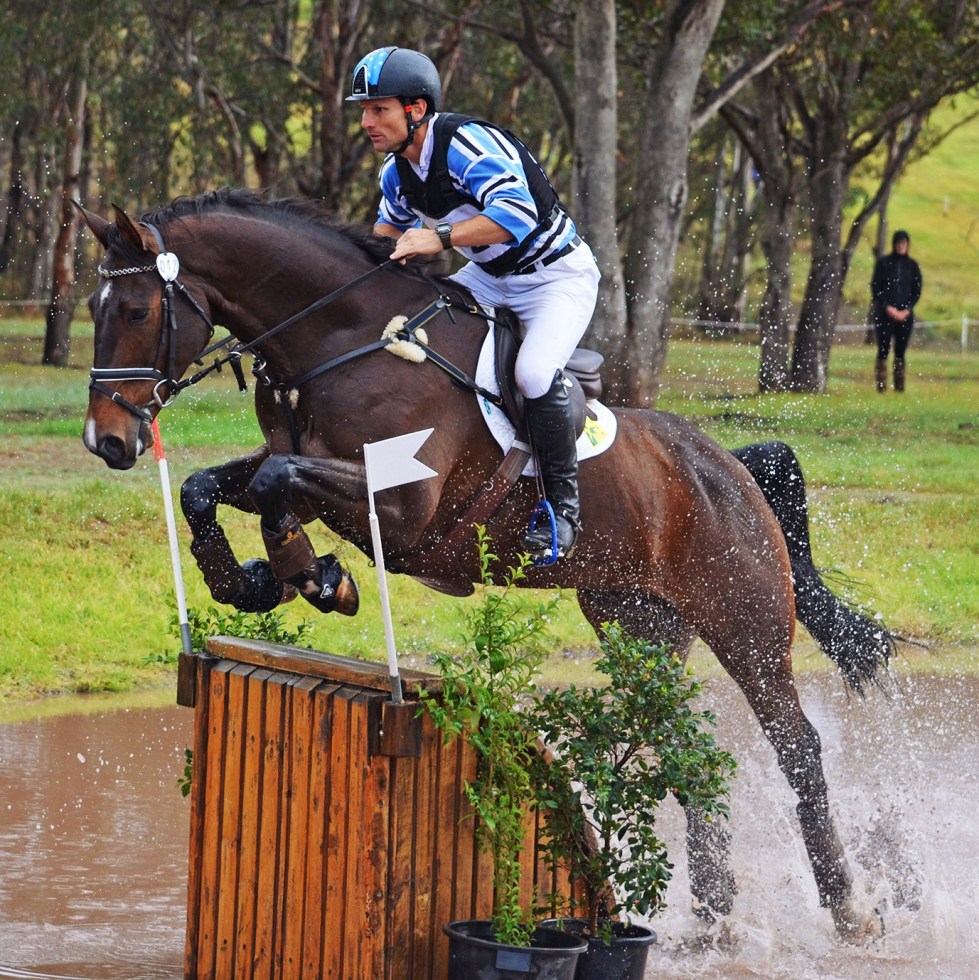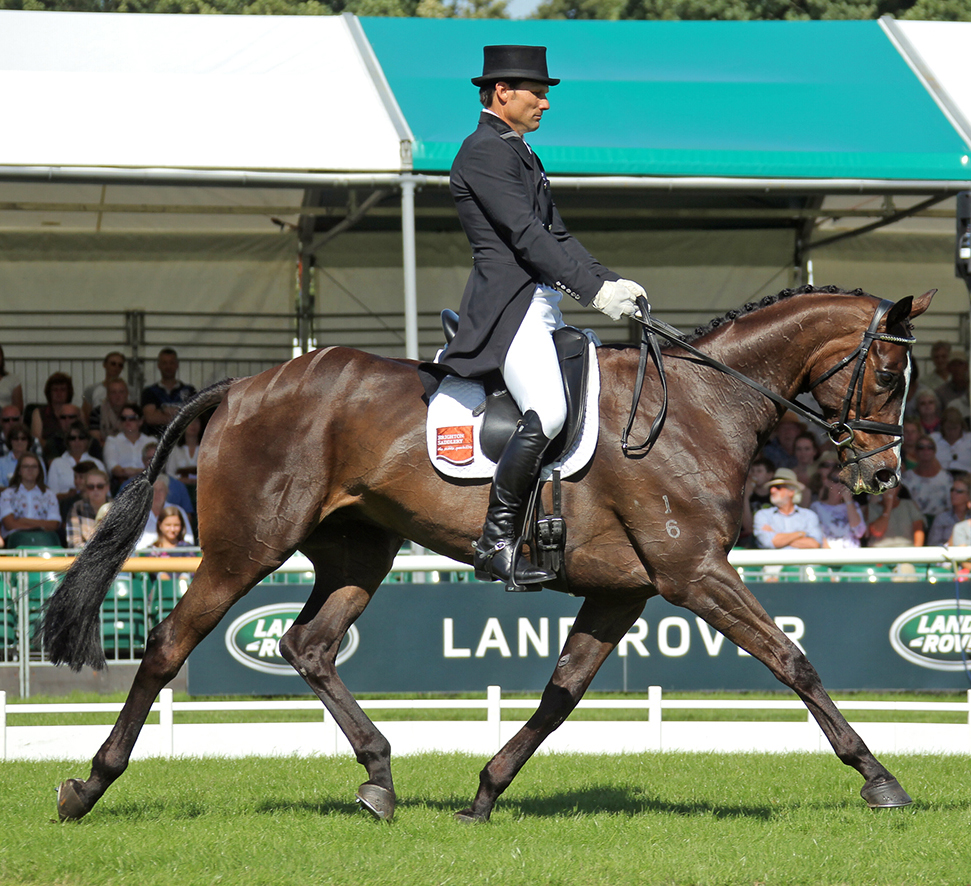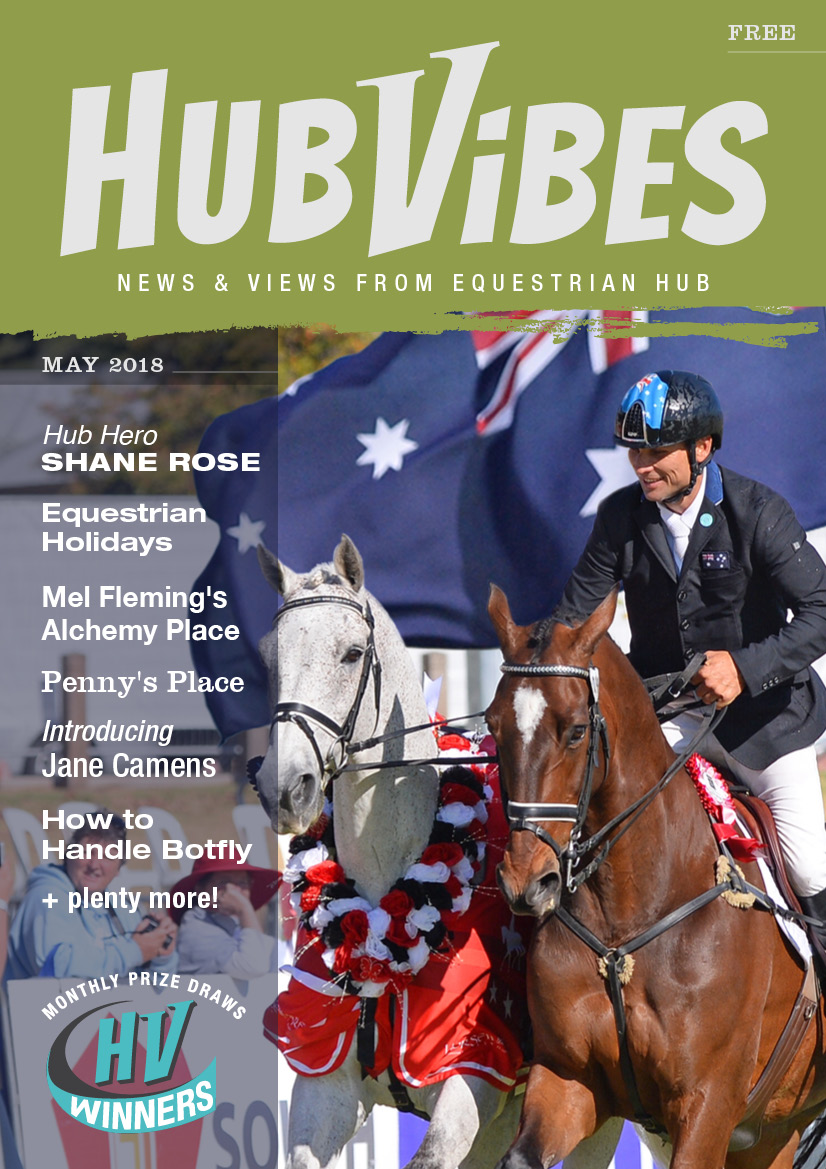Dual Olympic medallist, and current Australian eventing champion Shane Rose, is our Hub Hero this month.
What a lot of people don’t think about when they’re competing a horse is how the relationship really works. What you need to realise is that there are not that many sports that either involve just one other team member I can think of volley-ball and doubles-tennis off-hand but also a sport in which only one of you is actually the athlete.
It gives me pause for a moment, I’ve never really thought about it like that. That’s the thing, he says, in the rider/horse combination the horse is the athlete, and that is what makes it such a difficult sport. In the main it’s the horse that gets the injuries, the off-days, the bruises and sprains and it’s your job, as the rider to try to the best of your ability to keep that athlete in tip-top condition.

Mind you, the word combination is the key here since without a doubt no matter how talented a horse, rising through the ranks to the Olympics is no job for a faint-hearted rider, and faint-hearted Shane, who recently won the Australian Evening Champion CIC3* with his horse Virgil; is certainly not.
In the main Australia’s elite horse riders have to support their competition life in some way or other Shane’s chosen career was to break and pre-train racehorses, a choice which has seen him able to own outright his two most valuable horses, Virgil and Shanghai Joe, but has also caused him a litany of accidents, as long as his twice-broken arm.
I’ve broken both arms a couple of times, he says casually, both legs a couple of times my wrists, my thumb, ribs of course. I’ve had a split liver, a punctured lung and a golden staph infection. Worst of all was a kick to his face from a recalcitrant racehorse he was attempting to load into a barrier gate, which resulted in a week-long coma, and facial reconstruction.
However, he is quick to point out that in the main these were not eventing accidents but the result of working with young thoroughbreds. They can be naughty, he says, in what might quite possibly be the under-statement of the century.
If there was a bottle of brave medicine to be had, Shane was given a teaspoon every day from an early
age. The youngest of four children, he started riding when he was two, on a Shetland pony. By the age of five he was in the local pony club at Duffy’s Forest near Sydney and as a teenager he played representative rugby.
In fact, he suggests, working with racehorses is not dissimilar to playing Rugby. You can’t play rugby and not expect to get tackled, he says. There’s always a high chance a player will get injured but it doesn’t stop them playing.
In recent years of course, as the Warmblood has grown in popularity, the realms of eventing, and of each individual discipline, has seen less thoroughbreds at the highest level of competition, but Shane, like many other riders, remains convinced that a truly great thoroughbred takes a lot of beating. A thoroughbred is still the most athletic horse in the world, he says firmly, and for brain, willingness and trainability you’d be hard put to find a better horse. If you look a the 4* horses around the world, a lot of them are still pure thoroughbreds.
That said his ideal eventing horse would be a purpose-bred thoroughbred. By that I mean a thoroughbred with good eventing lines that has a bit of Warmblood in it. Like that you get the brain, speed and athleticism combined with the strength, movement and power of the Warmblood. You want a horse with heart and heat.
Heart and heat. It sounds a little like the man himself, who in between injuries and a few disappointments has racked up some
extraordinary achievements since he first represented Australia at the age of 21 in the Young Rider Trans Tasman competition with Mr Joe Cool. They won both the NZ Young Rider One and Three Day Championships – in 1996 Shane was selected on the squad for the Atlanta Olympic Games and went to the States with Joe. Unfortunately Joe went lame in the States just before the Games, but Shane was lucky enough to get some teaching jobs and a commission to set up a cross country course in the lead up to the Games. In 1998, Shane went to Rome with It’s A Knockout (Josh) and rode at the World Equestrian Games (WEG) as a member of the Australian team. The trip was a mixture of excitement and disappointment. After a
sensational dressage test, Shane realised about four jumps before the end of the course that something was seriously wrong with Josh, and decided to walk him to the finish line. The horse was exhausted. It turned out he had caught a bacterial infection which was cutting off his breathing. (Josh later recovered and competed in the 4* at Adelaide with no ill effect.)

Then, in 2001, Shane entered into a personal ill-health battle when he was diagnosed with thyroid cancer resulting in radiation treatment, and on this occasion it was rest and recuperation for the rider rather than the horse! I made a full recovery, he says. I guess it reinforced for me my philosophy of the cup being half-full rather than half-empty.
In 2003, Shane and his then partner now wife, Niki Chapman, (a well-known eventer in her own right, who placed last weekend in the 2* in Sydney, and also competes in dressage) purchased a property in Werombi one hour south west of Sydney. They named the property Bimbadeen Park and together set up their racehorse breaking and pre-training business along with their performance horse business.
In 2006, Shane was selected with All Luck for the World Equestrian Games in Aachen, Germany but did not complete the event. They did however have a successful Burghley CCI 4* debut in 2006 and finished in 3rd place at the prestigious UK competition. In 2008, the combination were selected for the Beijing Olympic Games and were members of the Team that won the Silver Medal for eventing. Since then, Shane has been selected to ride in another two Australian teams, firstly at the 2012 London Olympics with Taurus and then again at the 2014 World Equestrian Games in Normandy, France, where Shane and Taurus finished as part of the 5th placed Australian team. The team successfully qualified for a place at the 2016 Rio Olympic Games, bringing home a bronze medal.
The disappointment of his horse, CP Qualified, being disqualified in the cross-country phase for reasons which, he says, are still a bit vague, has only heightened his desire for Tokyo.
I was originally told that the horse was tired, but the next morning they changed the story and said his shoulders were outside the flags.
Despite the setbacks surely being a dual- Olympic medal champion must be a wonderful feeling? Yes, he says, but if you have a competitive nature then you feel you can always improve, and I’m hoping to have three or four horses by the time Tokyo comes around. I always want to do something better than I’ve done it before. In between times of course there’s the World Equestrian Games to get ready for, and Badminton later this year as well.
After his Sydney win, he’s sure he and Virgil are on track for WEG. He won easily, he says. He had plenty in reserve, and that’s what you want.
Shane and Niki now have four children, Olivia and Harry, five and four respectively, and two-year-old twins, Zarah and Lachlan, I wonder if the older two are showing the same passion for riding that their parents have? He laughs. Not quite yet, he says, although they potter around on their ponies at the moment.
But like the young horses he’s bringing along Finch Farm Spruce (bred by David Finch) for instance, give their youngsters time and I suspect there’s future Olympic Champions waiting in the wings, which brings me to the question of how, as a rider, you can tell if a horse has that special something ?
It’s a combination, he says. You train them and bring them along and at some point you realise they have something special a great showjumper will go into the ring and grow a hand in front of your eyes and won’t want to touch a single pole. As soon as it’s finished it might go back to being as quiet as anything, but showjumping is a passion for the horse. Winx is just a normal horse until she gets on a racetrack.
I’ve often wondered if horses know whether they’ve done well or badly does the ribbon ceremony mean anything to them, or is that just the human element? I think the special horses know if they’ve done well, or if something’s gone wrong, he says, it’s the same when we leave the property – if we’re taking just the young ones for example, the top horses all carry on and race up and down when they see the truck leaving because they want to be on it. In that regard I think the top horses in the world are not that different to highly-competitive people. You can’t force a horse to be brilliant, it has to want to do it.But if it’s a Shane Rose horse, it might just get a little help with an extra teaspoon of Brave Medicine from its rider.
Story taken from HorseVibes magazine, May 2018.




